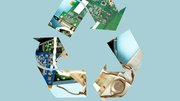Article
Omnichannel: A big reason for the cloud shift in restaurants
Cloud software allows operators to take an omnichannel approach to improve the speed of service, noted a panel of foodservice executives who shared their experiences during a session titled, "The cloud shift: line busting, kiosks and tableside ordering for enterprises" at the National Restaurant Show in Chicago.

May 22, 2019 by Elliot Maras — Editor, Kiosk Marketplace & Vending Times
In seeking ways to reduce guest wait time, restaurants are introducing self-order kiosks, mobile ordering and home delivery at a rapid pace. And that's one reason many are also moving from on-premise software to the cloud, which allows real-time access to data from a variety of devices regardless of their location.
Cloud software allows operators to take an omnichannel approach to improve the speed of service, noted a panel of foodservice executives who shared their experiences during a session titled, "The cloud shift: line busting, kiosks and tableside ordering for enterprises" at the National Restaurant Show in Chicago.
Both restaurant executives on the panel — Bo Osacky, vice president of technology strategy and services, Levy Restaurants and Marina O'Rourke, vice president of technology, Tropical Smoothie Café, agreed that open architecture software was necessary to have an omnichannel restaurant that enhances speed of service. Two Appetize Technologies Inc. executives — Brian Whitney, vice president of sales, and Kevin Anderson, co-founder and chief strategy officer, moderated the discussion.
Give guests choices
The panelists agreed that one of the key benefits of an omnichannel approach is to give guests choices in how they want to make their orders and get their food.
"I don't think it's a kiosk or online ordering or the app," Osacky said, as guests have different preferences. "Guests want more control, they want more convenience, and they want it their way," said Osacky, whose company manages foodservice for about 150 professional sports facilities and expects to triple its 500 self-order kiosks in its North American locations.
O'Rourke agreed, noting that her company's franchisees were recognizing that guests want to be served in different ways: some want to order using mobile phones, some want to use kiosks, some want to use the drive-thru and a growing number want to have their meals delivered. For delivery, some franchisees prefer to provide their own delivery service while others work with third party providers.
Both agreed that self-order kiosks bring important benefits, such as larger baskets, higher tickets, less loss due to theft and most importantly, more customer data.
Osacky and O'Rourke also said they prefer having cashless payment as much as possible.
Osacky, whose company operates one sports facility that is totally cashless, said customers prefer cashless payment because it is faster. His company surveyed customers on how long it takes to pay using cashless and found that most actually perceived the process to be faster than it actually is. He attributed this to the fact that when making a cashless payment, the guest controls the process and is actively involved in it.
Companies that serve customers across large geographic markets often notice regional differences in these preferences, Anderson said. "Different stores may have different reactions to technology," he said.
Be ready for new technologies
Another cloud computing benefit is the opportunity to improve data quality, which the panelists agreed is necessary to be able to take advantage of new customer experience technologies.
Still another benefit is it supports future technologies such as voice assistants and wearable electronics, which O'Rourke expects to see customers using to order food since these technologies are improving. She also expects to see voice assistants taking orders at drive throughs.
Osacky said he expects to see artificial intelligence and robotics. His company is working with Miso Robotics on automated grilling stations and concessions stands. Still another cloud benefit is that it is easier to manage data security, he said.
Anderson said he expects to see facial recognition technology expand in restaurants but added that he expects more government regulation in this area due to privacy concerns.
Restaurants looking to introduce line busting technology also need to consider more than just the software, said Anderson. Those looking to add self-order kiosks need to have the space in their stores. "You may not have the space to pull off self-service kiosks," he said.
The panel was not enthused about blockchain technology. Anderson said Appetize Technologies Inc. customers have not asked about it, hence, the company is not exploring it.
"I think we're going to see more personalized experiences," summarized Anderson.
About Elliot Maras
Elliot Maras is the editor of Kiosk Marketplace and Vending Times. He brings three decades covering unattended retail and commercial foodservice.
 ChatGPT
ChatGPT Grok
Grok Perplexity
Perplexity Claude
Claude










